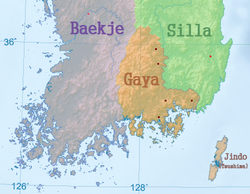Gaya confederacy
| Gaya confederacy | ||||||||||||
| 가야 (加倻) | ||||||||||||
|
||||||||||||
|
Map showing the approximate location of selected Gaya polities relative to Silla and Baekje
|
||||||||||||
| Capital | Not specified | |||||||||||
| Languages | Old Korean | |||||||||||
| Religion | Buddhism, Korean shamanism | |||||||||||
| Government | Monarchy, Union | |||||||||||
| • | ?–562 | Doseolji | ||||||||||
| Historical era | Ancient | |||||||||||
| • | Establishment | 42 | ||||||||||
| • | Submission to Silla | 562 | ||||||||||
|
||||||||||||
| Today part of |
|
|||||||||||
| Gaya confederacy | |

Duck-shaped pottery from Gaya, 5th or 6th century.
|
|
| Korean name | |
|---|---|
| Hangul | 가야 |
| Hanja | or |
| Revised Romanization | Gaya |
| McCune–Reischauer | Kaya |
Gaya (Hangul: 가야; Hanja: 加倻; RR: Gaya, Korean pronunciation: [ɡ~ɣaja]) was a Korean confederacy of territorial polities in the Nakdong River basin of southern Korea, growing out of the Byeonhan confederacy of the Samhan period.
The traditional period used by historians for Gaya chronology is AD 42–532. According to archaeological evidence in the third and fourth centuries some of the city-states of Byeonhan evolved into the Gaya confederacy, which was later annexed by Silla, one of the Three Kingdoms of Korea. The individual polities that made up the Gaya confederacy have been characterized as small city-states. The material culture remains of Gaya culture mainly consist of burials and their contents of mortuary goods that have been excavated by archaeologists. Archaeologists interpret mounded burial cemeteries of the late third and early fourth centuries such as Daeseong-dong in Gimhae and Bokcheon-dong in Busan as the royal burial grounds of Gaya polities.
Although most commonly referred to as Gaya (가야; 加耶, 伽耶, 伽倻; [kaja]), probably due to the imprecision of transcribing Korean words into hanja, historical sources use a variety of names, including Garak (가락; 駕洛, 迦落; [kaɾak]), Gara (가라; 加羅, 伽羅, 迦羅, 柯羅; [kaɾa]), Garyang (가량;加良; [kaɾjaŋ]), and Guya (구야; 狗耶; [kuja]). According to Christopher I. Beckwith, "The spelling Kaya is the modern Korean reading of the characters used to write the name; the pronunciation /kara/ (transcriptionally *kala) is certain."
...
Wikipedia

